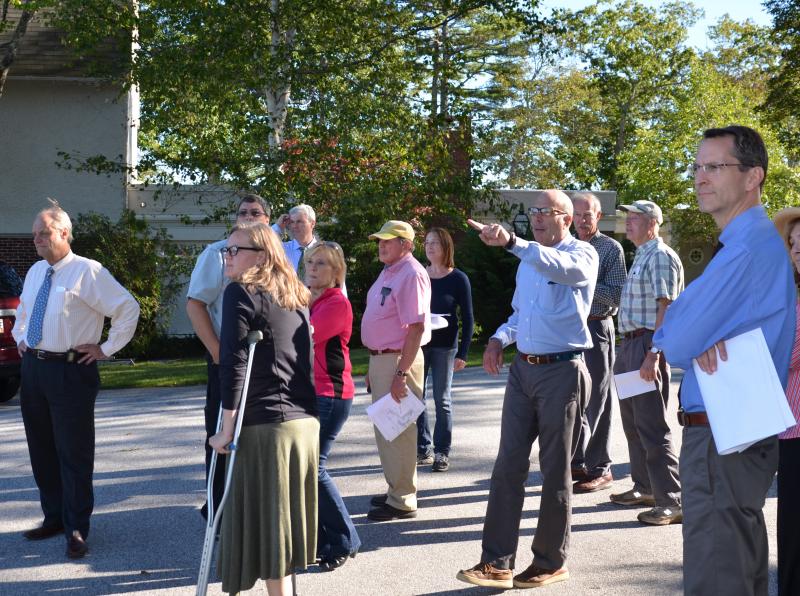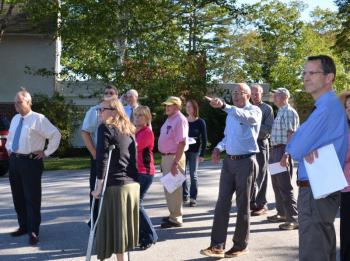Camden Planning Board walks Fox Hill estate; citizens, lawyers tag along
CAMDEN — The Camden Planning Board spent approximately one hour Sept. 18 touring Fox Hill estate, the proposed site of a Bay View Street alcohol and drug abuse treatment facility. Because the 3 p.m. walk-through constituted a public meeting, citizens were welcome to follow, as were lawyers and town officials; however, the “informational gathering,” as characterized by Camden Town Planner Steve Wilson, intentionally did not accommodate public comment.
That walk will be followed this evening, Sept. 19, by a regularly scheduled planning board meeting with one agenda item: “Continued board discussion about concerns and issues with proposed language change.” That meeting begins at 5 p.m. in the Washington Street Conference Room. That language change addresses the proposed zoning amendment that would allow a narrowly defined commercial use of the 13.8-acre property. Even if that zoning amendment does make its way before Camden voters, the use of Fox Hill as a high-end treatment center for alcohol and drug abuse clients — eight to 12 at a given time — would only be contingent on subsequent zoning board and planning board approvals.
Built in 1903, Fox Hill — formerly known as the Borden Cottage — is a Gilded Age cottage that became a quasi corporate retreat over the last decade. It has become increasingly under a spotlight since Fox Hill Real Estate LLC purchased it in May, and proposed its zoning amendment to allow special exceptions to Camden’s Coastal Residential zone. The estate sits in one of the priciest neighborhoods of the town, and Maine’s coastline, with its large summer cottages curtained by woods and rock walls.
In addition to assembling troops of seasoned Maine land use attorneys (Pierce Atwood; Dyer, Goodall and Denison; Paul Gibbons; Harmon, Jones and Sanford) to engage in legal pro and con arguments, as well as Portland advertising and marketing firms (Baldacci Communications, Kemp Goldberg), and one Hallowell-based planning and research company (Planning Decisions), the debate over turning Fox Hill into a treatment facility is lining some citizens up in two distinct camps. They are signing their names to advertisements and letters that have begun to appear in the local press, either opposing or supporting the project, in a campaign to move the Camden Planning Board toward their respective positions.
The planning board is now deciding whether or not to recommend that the amendment be placed before voters on a town meeting warrant. That decision could come tonight, after reviewing the ordinance language, or at a later meeting.
On one group-signed letter to the planning board, 34 opponents said traffic, noise and “other attendant issues associated with running a business are incompatible with a residential area.” They worry about the property values of their own homes in the district, and raise the spectre of zoning lawsuits that will cost the Camden taxpayer. The Coastal Residential zone exists in the Bay View Street area, as well as up High Street toward the northern edge of the Camden town line.
“Finally, legal issues being considered by the Planning Board are enough to tie our town in knots and lawsuits for years to come,” the opponents wrote in the letter. “Is this proposal too narrow? Is it too broad? Is it spot zoning? Is it contract zoning? Is this discrimination?....”
Most recently, lawyers for the opponents, hired by neighbors Leonard and Madlyn Abramson, who own property at 230 and 221 Bay View St., adjacent to and directly across from the Fox Hill property, are incrementally building their case against the project. They are now questioning the capacity of the sewage system there, as well as the possibility of pharmaceutical contamination seeping into the area’s groundwater supply because Fox Hill relies on a septic system to handle its effluence. Read the most recent letter, Sept. 16, to the planning board from Matthew Manahan, Pierce Atwood laywer.
In another letter, this one signed by 27 proponents, the project is defined as a boost to the economy, with employment opportunities for 20-25 clinical and administrative positions. They also cite the operation’s need for contract services that ripple out to the area’s food, grounds keeping and laundry businesses. They say the property, held by for-profit Fox Hill Real Estate, will also be a source of tax revenue for the town.
The property is currently assessed at $6.5 million by the town and property taxes are approximately $100,000 per year.
“There is no other piece of property like Fox Hill in Camden,” the proponents wrote. “It is a compound of too many large buildings with an obvious commercial component to them. As a result, this property could not be sold as a single-family dwelling, despite great efforts to do so. McLean’s proposed use of this unique lot of land is a perfect use because it keeps what is there intact and preserves the open space.”
As the opponents suggest lawsuits, the proponents suggest the property could fall into the hands of other owners who might subdivide and bulldoze the land for “multiple house lots.”
Meanwhile, the town is adhering to its mission of conducting due diligence for its citizenry, keeping municipal meeting schedules at its website, even loading all letters and documents received regarding Fox Hill in the Cloud. The process to put a zoning amendment before the voters is always methodical; in this case, it is painstakingly deliberate.
Acknowledging that the previous planning board meeting, held Aug. 29, took place in an overcrowded room, forcing citizens to find televisions or computers to watch the proceedings, Wilson topped the Sept. 19 meeting notice with a notice that the Conference Room has capacity for 64.
Fox Hill project
Project proponents want to turn the 13.8-acre Fox Hill estate at 235 Bay View Street into a high-end residential alcohol and substance abuse treatment facility for up to 12 clients at a time, each paying up to $60,000 for four to five weeks of treatment.
Owners of the estate, Fox Hill Real Estate LLC (24 investors, including Lincolnville summer resident Tom Rodman and Rockport summer resident Merril Halpern), hope to team up with the Massachusetts-based McLean Hospital to establish the facility in the former Borden Cottage that sits on a hill overlooking Penobscot Bay.
Rodman has said the other 22 investors are family and friends; “no Wall Street sharks,” he said.
Philip Levendusky, associate professor of psychology at Harvard Medical School and senior vice president for business development and marketing, as well as director of the psychology department at McLean Hospital, is representing the nonprofit that would be operating the facility.
The business deal between the for-profit Fox Hill Real Estate LLC and the nonprofit McLean Hospital, which would lease the property, is contingent on local zoning and site plan approval, as well as state regulatory approval.
The first step is voter consideration of a zoning amendment that would allow a facility like the Fox Hill treatment center to seek planning board approval on Bay View Street.
Read the proposed amendment here.
The amendment would adjust the town’s coastal residential parameters to allow special exceptions for “residential treatment facilities for comprehensive alcohol and related substance abuse disorders providing concurrent treatment for addiction and/or other associated psychiatric disorders.”
The next step, contingent on whether Camden voters approve the zoning amendment, is for the project to undergo site plan review by the planning board. It is only the result of that second process that determines whether Fox Hill is allowed to become a treatment center.
The zoning amendment will not be on the November ballot. It is not yet decided by Fox Hill proponents whether they will seek a special town meeting or wait until June Town Meeting for a townwide vote.
The first task, said Camden Attorney Paul Gibbons, who represents Fox Hill Real Estate LLC, is to craft ordinance language with the hopes that the planning board will agree to send on to the Camden Select Board for its consideration, before that board decides if it goes before voters.
“There are only chairs for the rated occupant load and once these are filled there can be no more people allowed in until another person leaves the room,” he wrote. “This is a life safety requirement, there cannot be additional persons allowed to sit on floors and window sills, etc. If the number of people exceeds allowed, all proceedings will stop until the count is reduced to allowed maximums.
“All proceedings are recorded on DVD, broadcast live on Channel 22, and also are available live and for replay on the web. Future meetings when public input for the Fox Hill Zone change request is anticipated will be held in the Opera House and advertised on the Camden Web Page. These maximums are for occupant safety and are not meant to deter public comment on any Planning Board items past or future.”
Addictions, mood disorders and the economics of treatment
Concerns raised by opponents have cited the project’s incompatibility with the town’s comprehensive plan, that its approval requires a zoning change for an historically residential neighborhood to allow a commercial activity, that such a business clientele would attract paparazzi to the neighborhood, and because that purpose — serving clients with specific substance abuse issues — is not appropriate for that area of Camden.
Yet, the proposal over turning a Bay View estate into a treatment center has sparked broadening discussions about Knox County’s own addiction and substance abuse problems. At the Aug. 29 planning board meeting, when the Washington Street Conference Room was bursting at the seams with residents listening and waiting to speak their minds, and at earlier meetings about the proposal, local health care professionals cited drug and alcohol abuse, as well as suicide, in the area.
Some of them have advocated that having McLean Hospital, with its historical credentials and association with Harvard Medical School, involved would benefit the entire region, specifically with substance abuse education and programs. Despite the fact that Fox Hill is targeting clients of an economic stratum who would be able to afford a rehab price tag of $60,000 for a month, McLean Hospital’s Philip Levendusky has pledged community outreach support.
He said Aug. 29 that he has had “productive discussions” with Pen Bay Healthcare, which oversees a group of medical services in the area, including Pen Bay Medical Center. He also said a focus group of 25 mental health providers had convened at Fox Hill earlier in the month to talk about substance abuse issues in the community, citing auxiliary issues of homelessness, the lack of grant money, and the lack of transportation of those needing to get to and from treatment.
Following the Aug. 29 meeting he said in an email that “there have been a couple of very collegial, constructive meetings between McLean and Pen Bay professional staff and leadership designed to meet and greet as well as explore possible collaborative opportunities. All whom we meet at Pen Bay were gracious and welcoming. It is an impressive hospital that could serve as a sophisticated medical backup resource for our proposed program.”
On Sept. 18, he said those outreach programs could entail providing speakers for local educators, guidance counselors, therapists and doctors. McLean Hospital is often asked to provide help with a range of community concerns; most recently, he said Boston’s police department asked the hospital to establish a trauma program for First Responders in the wake of the Boston marathon bombing.
At the Aug. 29 meeting, opponents questioned how emergencies would be handled, citing the possibility of ambulances and helicopters arriving at odd hours; “people who are addicts tend not to sleep well,” said one resident.
“They will be sleeping, hopefully, like babies throughout the night in a beautiful environment,” said Levendusky.
He added that co-occuring conditions to be possibly treated there include anxiety, depression and mood disorders. But, he said, psychosis and other mental disorders are not part of the program.
“Psychosis is not a considered a co-occurring disorder,” he said.
He referred to a letter (see above PDF to read it in entirety) from John Lebeaux, town administrator of Princeton, Mass., who said, “The Police Chief reports that the number of public safety responses made to the facility is in no way burdensome on the resources of the town's small police, fire and EMS agencies.”
Princeton, Mass., is home to McLean’s Fernside, a similar facility to that which is proposed for Camden: a large home where clients with expendable income go to privately confront their addictions.
Princeton is a small town, population 3,413, and regarded as an affluent bedroom community of Boston.
Princeton Police Chief Michele Powers said in a phone call subsequent to the meeting that her public safety department, which includes ambulance and fire, responded to 3,588 traffic and emergency calls in 2012. Of those, eight were associated with Fernside.
Some of the calls were responses to fire alarms; others were ambulance calls.
Two Princeton town officials attended the Aug. 29 Camden Planning Board meeting to describe how Fernside fits into their town, and how the permitting process was received in that town. Levendusky said he had asked them to write letters to the planning board describing their experience with permitting Fernside and then living with it in their community. The two then offered to attend the Camden meeting, said Levendusky, Sept. 18.
“We certainly heard a lot of community concern,” said Alan Sadkowski, a former Princeton selectman, Aug. 29. Citizens there, he said, worried about increased traffic, who would be the clientele, what public safety costs — e.g., police, medical and fire — would be incurred by the town, and what would happen to the property taxes.
“None of those concerns have ever been an issue,” said Sadkowski. “They [McLean] pay payments in lieu of taxes.”
Princeton Town Administrator John Lebeaux said Sept. 19 that McLean and the town hammered out a 20-year graduated lieu-of-taxes payment plan based on residential property taxes. In 2006, McLean paid $10,974 to the town and in 2026 is to pay $17,982.
“They’ve proven to be very good citizens,” said James LaChance, a Princeton Planning Board member, who was also in Camden Aug. 29 to answer questions about Fernside. “In all these years, I have never learned the identity of a single person who went to this facility.”
Levendusky emphasized the efforts to keep the treatment facilities private.
“We don’t want intrusion,” he said.
But intrusion is what neighbors on Bay View Street worry about. Don Abbott, a resident of Bay View Street, said the neighborhood is important.
“It was made a residential area with a lot of consideration for zoning 20 years ago,” he said, Aug. 29. “It’s a neighborhood. Every day I walk my dog on the road. I see neighbors and we talk. It is not some black car driving by. It’s a beautiful neighborhood. People come from all over. It’s real. To breach the zoning for that area would be a travesty.”
MBNA founder Charles Cawley, who owns property across the street from Fox Hill, and who owned Fox Hill estate until he sold it to Matt Simmons several years ago, said Aug. 29 he was “sort of neutral.” But he added: “If you force me to vote, which fortunately, nobody can, I probably would be against it for one reason. I lived at Fox Hill for 22 years. I grew up in the summertime in Lincolnville living on a little hill on Route 1 in a different world than Fox Hill. This whole area is a wonderful place. I don’t think McLean is going to bring 1,000 people here but I think it is a going to be a significant change and character of the town that, over time, will change the town a lot. Probably I will be in a new residence at Sea View Cemetery by then.”
He then turned to the crowded room and said: “If you think business was going on in there [Fox Hill estate], you’re nuts, nuts, nuts.”
His latter comment referenced the contention by Fox Hill Real Estate and other citizens that Fox Hill had already been used in a quasi-commercial fashion in years past under its ownership by Simmons and Cawley.
Mark Durkus, of Hope, said he formerly worked at Fox Hill as a project manager and dealt with traffic in that location, qualifying it as “one of the bigger nightmares of my job.”
He spoke in favor of a treatment center there, saying 95 percent of the road would not be used by the facility. He said much of the traffic for Fox Hill used Chestnut Street.
“My experience of bringing hundreds and hundreds of trucks, never once did you use Bay View Street,” he said, Aug. 29.
“It is a very specialized property,” he said. “Unless you want to wait around for a car collector, train specialist and movie buff, I can’t imagine you are going to wait for this guy to come around. The property sounds kind of commercial to me.”
Camden resident Meg Sideris said, “Mark Durkas made the point I was thinking about, that the change has already come to that property. If we are trying to imagine how to keep our neighborhood intact, the changes were made. I, as a resident, turn to the best use of that property, now. It’s hard to imagine that a subdivision would be an improvement to the neighborhood. Zoning, in this case, is catching up to reality in thinking of the next use.”
Traffic
Residents in the neighborhood are concerned that the number of vehicles will increase with employees coming and going at Fox Hill. Joe Fay, who lives on Lily Pond Drive, said a Chestnut Street school bus stop is on the corner of Bay View Street.
“Coming down that hill [Chestnut Street], everybody speeds,” he said. “Traffic is a concern. In the summer, you have to watch. With this proposal, there will be traffic all year-round, not just in summer.”
The neighborhood, he said, has a “wonderful, safe atmosphere. It’s why we moved here. Their proposal changes all that. It must stay residential. I couldn’t agree more with Mr. Cawley.”
Another resident said Fox Hill had been used commercially over the years, which changed the nature of the area. He cited tour buses parked along the cemetery lines, and then said, given the taxes, the solution would be to subdivide the land. The neighborhood is the town’s breadbasket, he said.
Dyke Messler, of Camden, also suggested that subdivision of the land, instead of a drug treatment center, would benefit the town more with property tax revenue. He cited the Mountain Arrow subdivision off High Street at the northern edge of Camden’s downtown. It is a well-planned development, he said.
“Some neighbors around Mountain Arrow Drive weren’t happy, but the property was zoned for 70 houses,” he said, and threw out the idea of even tearing down Borden Cottage. “A sensitively planned subdivision would benefit the area.”
Concerning traffic, Levendusky said while there are an expected 21 fulltime employees associated with the project, their arrivals and departures would be staggered. He broke the shifts from 7 a.m. to 3 p.m., when three people would arrive. At 10 p.m., three would leave and two others would arrive. Ten professionals would straddle two workshifts.
(To read the employment schedule at Fox Hill, as proposed and submitted to the Camden Planning Board, see the above PDF.)
Economics
Still others continue to argue that the treatment facility would provide employment in a region that needs more consistent employment.
“A lot of people have genuine concerns in the area,” said Dave Block. “We are not drawing people to this community with real jobs. McLean will create jobs, $1.25 million in salaries, plus contractors and workers.”
Phil Fowler, on the other hand, said, “I understand the need for what that gentleman said. Having said that, this town is so beautiful with the mountains and the sea. It is incomprehensible that businesses like this go into a residential [zone]. This is spot zoning.”
Camden resident and Clinician Wendelanne Augunas said Aug. 29 that the project would create not just jobs, but fulltime employment.
“What if this works well,” she said. “What if traffic is worked, what if it brings the topic of addiction and substance abuse on top of the table, not under the table? What are the possibilities of a good business, good enterprise brought into the community? The fact that we could have the presence of McLean Hospital in our community would be incredible.”
Fox Hill Real Estate LLC commissioned an economic impact report, which resulted in 13-pages, titled “The Economic and Fiscal Impact of a Proposed Alcohol Rehabilitation Facility on the Town of Camden, Maine.”
Its authors, the Hallowell-based Planning Decisions, said Camden faces four fundamental challenges: a declining and aging population, declining employment, high and growing seasonality, and a taxable property base that is growing more slowly than the state average.
The report said the facility would return $130,000 in anticipated property taxes per year, result in an expanded number of jobs — 46 — with a correlated annual $5.025 million circulation of dollars into the local economy.
Manahan, in his Sept. 16 letter to the Camden Planning Board, countered those economic conclusions, writing: “The alleged economic benefits would be the same or greater if the use were required to be in the B-2 or B-3 districts, where it is currently allowed.... In addition, there is nothing in the proposed ordinance language that prevents the property owner from converting to, or selling to, a nonprofit entity and thereby removing the property from the town’s property tax rolls.”
Manahan said Aug. 29 that his clients, the Abramsons, have had a house in Camden for 18 years. He added, “Jack Sanford wanted me to say that this Planning Board is well respected by the citizens of Camden, zealously protecting the zoning ordinance and comprehensive plan. This threatens the integrity of the comprehensive plan. It is the first time the Planning Board ever considered making a residential lot into a commercial use.”
He said it was contract zoning.
“If the town approves, that would violate state law and open up the town to legal action,” he said. “That would be unfortunate, because you don’t need to do it.”
Attorney Paul Gibbons argued that in 1993, the town changed ordinance language to accommodate the Whitehall Inn business. The provision was challenged as spot zoning and landed in the state’s Law Court, the Maine Supreme Judicial Court.
“The Law Court said no, it was not illegal spot zoning and did not violate the comprehensive plan,” said Gibbons.
Attorney Cliff Goodall said Aug. 29, “This proposal is to create a special exception. We are asking for a special exception because of the unique character of this type of property. The conditions can be in the ordinance amendment itself. Plus, it has to go to the Board of Appeals for a special exception permit. It has to go to site plan review. If you folks think this property, and other limited properties, are unique enough that they could have this type of residential facility in a residential area, if subject to a lot of conditions and would be compatible, then the special exception works.”
Camden’s town attorney Bill Kelly had the last legal word Aug. 29, telling the planning board that the matter before its members constitutes a zoning amendment request.
“Focus on the language in the amendment,” he said. “It is about substance abuse; the amendment is not limited to alcohol.”
And, he said, “I want you to focus on the comprehensive plan.”
Related stories:
• Two Fox Hill neighbors say Camden's Bay View Street not appropriate for alcohol treatment center
• Renewed effort to make Camden’s Fox Hill estate an alcohol and substance abuse rehab center begins
• Camden’s Fox Hill changes hands, its future under consideration
• McLean Hospital looks to Camden's Fox Hill for alcohol, drug rehab center
• Camden's Fox Hill rehab deal nixed by landowner, buyer mystified
• No more phone polling of Camden residents about Fox Hill
Editorial Director Lynda Clancy can be reached at lyndaclancy@penbaypilot.com; 706-6657.






































